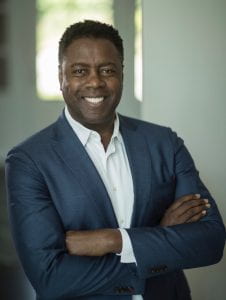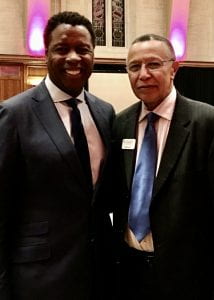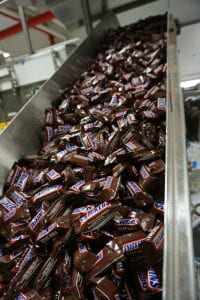
Anton Vincent
BLOOMINGTON, Ind. – Since graduating in 1993 with an MBA from the Indiana University Kelley School of Business, Anton Vincent has been responsible for indulging our sweet tooth through managing iconic brands such as Snickers®, M&M’S®, Betty Crocker desserts and ice cream.
Today, as the president of Mars Wrigley North America, maker of the world’s most beloved treats and snacks, Vincent was one of nine Kelley alumni who were among Savoy magazine’s 2021 Most Influential Black Corporate Directors.
Vincent, who previously was CEO of the fresh convenience food supplier Greencore USA and a top executive and 20-year veteran at General Mills, agreed to sit down for an interview about what the Savoy recognition means to him and how his experience as a corporate director informs his current role as Mars Wrigley’s president.
At General Mills, he was a founding member of General Mills’ renowned Black Champions Network (BCN). He serves on the board of directors for the International Paper Company and is a member of the Kelley Dean’s Council.
Vincent also was the latest guest in “Kelley’s Conversations with the C-Suite” webinar series on Dec. 2. Previous alumni who have participated in the series have included John Chambers, MBA’76, chairman emeritus of Cisco Systems and CEO of JC2 Ventures.
We discussed the value of having top executives serving on the boards of other companies.
Question: Obviously you have had a lot of personal career success, working within companies, but why is it so important that we recognize the involvement of directors?
“It is important for a lot of reasons. Directors’ jobs are about governance and strategy in the future and about holding management accountable for stakeholders’ interests. When you’re behind those closed doors and you’re having conversations with management and executive teams, it’s very important that you have people who are highly skilled, but also very principled and thinking long term about their questions for management. It’s a role that’s not done in public – nor should it be – but it’s absolutely critical to the health of any enterprise, particularly from a governance and strategy perspective.”
Question: This is a list of African American directors, including those like you are successful business people as well as those from other fields. Has representation on corporate boards by those from underrepresented groups improved? Why is it so important to have them at the table?
“It’s important and at the core to any company to have not just representation, but also insights into their customer base, and that should be reflected throughout, at all levels of the company and from the junior levels to top management executives – and eventually to the boards. I don’t think that you can be a modern, forward looking company if you don’t understand that concept and how it is valid to the organization.
“From a number’s perspective, I would say that it has been improving slowly. I like to think that people are understanding and valuing diverse voices on boards, because it’s beyond the right thing to do — to something that is totally critical to your business model. A lot of these organizations are global organizations and diversity, equity and inclusion is a very broad concept.

Vincent with Allyn Curry, a mentor who was instrumental in creating and enhancing diversity initiatives at Kelley for 30 years.
“We’ve learned in the last five to 10 years that the whole concept around ESG (environmental, social and governance metrics) ideas are absolutely essential to making sure that the investor proposition is strong. Boards and executive management understand that and have begun to embed that into how they run organizations. It takes diverse groups around a table to be aligned with ESG and to make sure that management is executing in that manner.
“Being on the other side of the table and having to advocate on behalf of shareholders and for long-term management and enterprise is an awesome responsibility. It’s one that has to be taken seriously and as companies are constructing a board, there has to be a lot of intentional thinking about who you put around that table and how they’re putting that governance structure around the executive team. It goes far beyond capability.”
How has your experience as a director at International Paper informed your work as a top executive at a confectionery company — Mars Wrigley — and other companies where you previously have been?
“That’s a great question. It’s important for people to understand that even as senior executives we’re developing also. We still have development needs and at some point, your development becomes far away from your capability, proving you can do the job and hit numbers. It really is around other things. It helps me to understand a different industry, helps me to understand a global industry and there’s a lot more to understand about the paper and packaging space – more than most people know.
“Most importantly, it helps me to understand mitigating and aligning the interests of management and the shareholders, because at the end of the day that’s what I really need to do as an executive and that’s what I need to when I am on the other side of the table as a board member as well. Being on both sides of the table, if you would, actually makes you stronger on both sides. Being on a board makes me a stronger executive.
“Being a working executive makes me a much better board member, because I’m in touch with the issues that executives are trying to manage and I understand the operational issues they face – both in the short term and the long term.
“I liken it to cross training. You go and train in some other area to make different kinds of muscle strength by working them in a different way. I liken my board experience to that. This is exercise for us, but these also are high stakes. Every decision is a big decision, every conversation is an important conversation and you are impacting organizations, industries and people’s lives. That is a high calling for sure.”

Packed with roasted peanuts, nougat, caramel and milk chocolate, Snickers® is among Vincent’s favorites.
Thank you for sharing your thoughts on your corporate board experience. To wrap up, I’d like to close with a fun question that’s a little lighter and perhaps sweeter. What’s your favorite candy made by the Mars Wrigley company?
“(Laughing) I love all my children, but I do have favorites. My favorites are our peanut M&M’S and Snickers – I have two favorites. They also happen to be among the biggest brands that we sell. The thing I like about them is they actually have a fair amount of nutritional value. If you look at the labels, there’s a high percentage of peanuts. When you combine that with the unique technology that we put around them, with the chocolate and the shells, it’s incredible. They also have lasted the test of time. They are brands that to this day continue to grow.
“Snickers is the ultimate chocolate bar. It satisfies your hunger in a very cool way and I think we’ve done a good job of connecting to culture through our associations, with the NFL being a big one for us as well.”
So, when you haven’t had a Snickers, who plays you in the commercial?
“(Laughing) Thank God I am not in a commercial.
But if there was a commercial featuring you, would Samuel L. Jackson play you, maybe?
“(Laughing) First of all, Sam is expensive, but he would be good because he is a provocateur and I think he could really bring out a lot of things we talk about with Snickers – only in a way that Samuel L. Jackson can. I’m going to have to call his agent.”